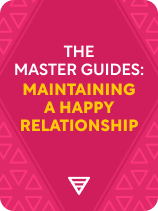

This article is an excerpt from the Shortform book guide to "The Master Guides: Maintaining a Happy Relationship" by Shortform. Shortform has the world's best summaries and analyses of books you should be reading.
Like this article? Sign up for a free trial here.
Do you acknowledge the difference between constructive criticism and destructive criticism? Do you sometimes shut down because you’re feeling overwhelmed?
Like every couple, you and your partner face conflict at times. But, you can still have a happy relationship despite these conflicts as long as you learn to manage them effectively. Specifically, experts recommend that you learn to recognize damaging relationship patterns so that you can avoid them.
Read more to understand these patterns and see whether they’re in your own relationship.
Recognizing Damaging Relationship Patterns
In The Seven Principles for Making Marriage Work, relationship researcher John Gottman and coauthor Nan Silver explain that conflicts can destroy relationships if they induce regular flooding—a psychological phenomenon in which one partner feels so emotionally stressed that they’re unable to respond rationally to their spouse. The authors name four damaging relationship patterns—the “four horsemen of the apocalypse”—that you should watch out for because they may heighten the risk of flooding, which leads spouses to emotionally detach from one another. The fifth relationship pattern we include comes from the book Attached.
1. Criticism. One person expresses dissatisfaction with their partner generally instead of expressing dissatisfaction about a specific issue. For example, they say, “You’re a slob,” instead of “You didn’t clean the kitchen when you said you would.”
2. Contempt. One person expresses dissatisfaction in a way that belittles their partner and signifies a lack of respect. For example, they might say, “I can’t believe you forgot to clean the kitchen. Are you stupid?”
3. Defensiveness. One person, who feels attacked by their partner, tries to protect themselves. But this strategy backfires because it shifts responsibility onto the other person. For example, the spouse who didn’t clean the kitchen might say, “I may have forgotten to clean the kitchen, but I cleaned the bathroom, which you never do.”
4. Stonewalling. One person feels overwhelmed and stops responding. (This person is likely feeling flooded.)
5. Anxious-Avoidant. In Attached, psychiatrist Amir Levine and psychologist Rachel Heller describe another damaging relationship pattern that couples may fall into. A couple may get stuck in a cycle of conflict because their intimacy needs clash. If one partner is avoidant (generally uncomfortable with intimacy) and the other is anxious (highly desirous of intimacy), the anxious attacher always wants to be closer. The avoidant attacher will occasionally accept increased intimacy but soon grow uncomfortable and withdraw. The anxious attacher responds to this withdrawal by trying to reconnect—which repels the avoidant partner even more.
Levine and Heller note that, while these partners may love each other, their interactions tend to worsen over time because the couple’s different needs expand into every corner of life. For example, if Avoidant Annie is reluctant to marry because she wants to maintain her independence, that desire probably won’t disappear after the wedding—and may later manifest in a fight about whether to vacation together or separately. Every aspect of their shared life becomes a point of contention, and each partner’s happiness in the relationship deteriorates.

———End of Preview———
Like what you just read? Read the rest of the world's best book summary and analysis of Shortform's "The Master Guides: Maintaining a Happy Relationship" at Shortform.
Here's what you'll find in our full The Master Guides: Maintaining a Happy Relationship summary:
- Advice from top relationship experts on how to maintain a happy relationship
- How to sustain both emotional and physical intimacy
- How to handle conflict so it doesn't ruin your relationship






